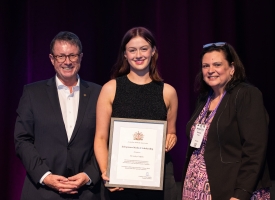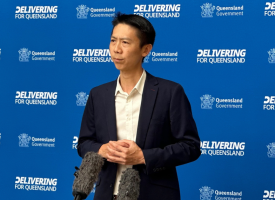President’s update: fakebook ads, fake fraud, committees and other meetings galore
AMA President Dr Danielle McMullen provides members with an update from the national AMA.

Hello, and happy Friday to you all! Plenty of updates to get through this week, so let me begin.
I wrote to Communications Minister Anika Wells, urging the government to introduce clear and enforceable regulations on health-related advertising online to crack down on scams impersonating health professionals (including me!). Many of you will have seen the “deepfake” AI videos mimicking respected doctors, such as Dr Norman Swan, former AMA President Professor Kerryn Phelps, and Professor Jonathan Shaw. These sham videos promote unproven products and pose real health risks. More needs to be done! [Sidenote: despite what you may have seen on social media, I do NOT recommend the use of bee venom to cure arthritis!]
And while we’re online, we also took the opportunity this week to call out the inaction from government on the late Peta Murphy’s parliamentary inquiry into online gambling. Her 31 sensible recommendations have gone largely unimplemented, while we see Australians spend more than $31 billion per year on gambling — that’s more than we spend on aged care, and rivals the NDIS budget. I’ve also seen some horrific social media accounts which glamourise gambling, overexaggerate wins, and aggressively target younger people. Gambling is a health risk, and it's another area where we need advertising regulation to get ahead of social media trends.
There’s been another swipe at doctors this week in the form of the Health Services Union (HSU) report full of baseless claims of Medicare fraud. We’ve been quick to pour cold water on this nonsense, and it seems most of the media in the wake of its release have been listening to our evidence-based response. We’ve of course been through this before, and the 2023 review conducted by Dr Pradeep Philip found that the overwhelming majority of doctors are doing the right thing, and where MBS compliance issues exist, they were largely caused by the complexity of the system — confirming the claims about Medicare fraud are vastly inflated and unsubstantiated. We of course continue to work with the department on improving the structure of the MBS to meet the needs of today, and on modernising compliance frameworks.
Our AMA Council of Doctors in Training (CDT) had a LOT to get through when they met last weekend, including updating their position statement on Clinical Academic Pathways in Medicine Position Statement to encourage quality clinical research. CDT also discussed the complexities in supporting doctors who return to work after a prolonged absence, training in complex and non-traditional environments and they heard about state and territory doctor-in-training issues. As always, discussions with the future of our profession were inspiring — there is real appetite from doctors-in-training to contribute to a better healthcare system.
Our Public Health Committee also met this Wednesday and held a timely discussion on immunisation, given the horrifying fall in immunisation rates we’ve seen recently across Australia. Another focus of discussion was women’s health. There was celebration of the recent MBS and PBS changes to better support women throughout their lives, but also recognition that adequate funding and practical requirements for some of the new items (like the menopause health assessment) still need our advocacy efforts.
Lots of meetings this week with an unruly number of abbreviations — this week we met with ICA, and participated in other meetings to discuss the CDC and UCCs.
I met with the Insurance Council of Australia (ICA), which is the peak body for insurers (including MDOs). The council took a keen interest in the medicopolitical landscape, our election advocacy, and our ongoing efforts around reform of Medicare items. I know that the medicolegal risk of changing models of care and the cost of insurance are both issues which worry our members. We continue to engage with MDOs on all of this and more.
The AMA has long been advocates for an Australian Centre of Disease Control (CDC...ACDC!) and celebrated the establishment of an interim CDC last year. With a permanent CDC set to be established by January 2026, we continue to work with government on its settings, including the legislative arrangements under which it will operate. What’s important to us is that the advice it provides is scientifically sound, and clinically-led.
Lastly, thanks to Dr Karen Price (our chair of Council of General Practice) who took part in a consultation meeting as part of the next phase of the UCC evaluation. Broadly, our position remains that while we support improved access to urgent and after-hours care for patients, this is best done in a way that supports continuity, and through the usual GP whenever possible. There is much we could do to improve the provision of urgent and after hours care in general practice — starting with allowing access to after-hours MBS rebates from 6pm! But, if the government is to continue down the path of more UCCs, we insist they use existing general practice infrastructure, instead of competing with general practice, be led by GPs and provide a triage service to ensure patients access appropriate care.
Speaking of GPs, I look forward to our Council of General Practice meeting this weekend, and I’ll update you next week.
Have a great week!



